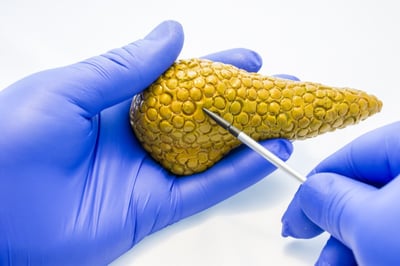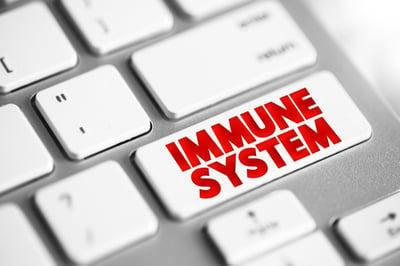Detrás de los titulares sobre el cáncer
Obtener más información sobre el programa de XRAY



Relevancia: Media-alta
Este artículo es de mayor interés para: Mujeres negras que viven en los Estados Unidos.
Actualización: Desigualdades por cáncer de mama en mujeres estadounidenses de raza negra
La Asociación Estadounidense de Investigación Oncológica (AACR, por sus siglas en inglés) publicó un informe en 2020 donde trata el tema de las desigualdades por cáncer entre los grupos raciales y étnicos de los Estados Unidos. En este informe se destacan los resultados sobre la carga del cáncer de mama en mujeres negras. (8/5/21)
Leer más ›


Relevancia: Media-alta
Este artículo es de mayor interés para: Personas con cáncer de páncreas
Artículo: Resumen de las opciones de tratamiento contra el cáncer de páncreas
En esta publicación se evalúan las estrategias actuales de la atención médica contra el cáncer de páncreas y los posibles tratamientos futuros. (publicado el 28/7/21)
Leer más ›


Relevancia: Media-alta
Este artículo es de mayor interés para: Hombres con cáncer de próstata avanzado
Estudio: La puntuación de la prueba tiene la capacidad de predecir cuáles pacientes con cáncer de próstata pueden omitir el tratamiento combinado sin correr riesgos.
El estudio muestra que la puntuación de una prueba que calcula el nivel de agresividad del cáncer de próstata de una persona también puede identificar el tratamiento más adecuado para los pacientes. (Publicado 9/7/2021)
Leer más ›


Relevancia: Alta
Este artículo es de mayor interés para: Personas con mutaciones hereditarias en el PALB2
Estudio: Riesgos de padecer cáncer en personas con mutaciones hereditarias en el gen PALB2
En el estudio de mayor tamaño realizado hasta la fecha en personas con mutaciones hereditarias en el PALB2, este gen se relacionó con un mayor riesgo de por vida de padecer cáncer de mama (hombres y mujeres), cáncer de ovario y de páncreas, pero no se relacionó con el cáncer de próstata o colorrectal. (publicado 1/7/21)
Leer más ›


Relevancia: Alta
Este artículo es de mayor interés para: Mujeres que padecieron cáncer de mama y están considerando el embarazo.
Estudio: Las mujeres pueden tener embarazos seguros después de haber recibido tratamiento contra el cáncer de mama
En un extenso análisis de todos los estudios publicados hasta la fecha, se presentan datos que respaldan que las mujeres que se sometieron a tratamiento contra el cáncer de mama han tenido embarazos seguros y no se ha observado un aumento en el riesgo de recurrencia. Los bebés de las mujeres que recibieron tratamiento contra el cáncer de mama eran más propensos a tener bajo peso al nacer, ser prematuros y tener un menor tamaño, pero no se observó un aumento en las anomalías congénitas. Las mujeres que se embarazaron después de haber sobrevivido al cáncer de mama presentaron riesgos similares de recurrencia y supervivencia que las mujeres que sobrevivieron pero que no se embarazaron (publicado el 24/6/21).
Leer más ›


Relevancia: Alta
Este artículo es de mayor interés para: Personas interesadas que tienen riesgo de padecer cáncer de endometrio, ovario o mama.
Estudio: Las pastillas anticonceptivas pueden ofrecer protección a largo plazo contra el cáncer de endometrio y ovario
Un extenso estudio mostró que las pastillas anticonceptivas pueden proteger contra el cáncer de endometrio y ovario, aún cuando las pastillas se hayan dejado de tomar hace varios años. (publicado el 1/6/21)
Leer más ›


Relevancia: Media
Este artículo es de mayor interés para: Personas con cáncer de mama triple negativo no metastásico con alto riesgo de recurrencia.
Actualización: La FDA autoriza las pruebas de una vacuna diseñada para prevenir el cáncer de mama
Durante años los científicos han trabajado para desarrollar una vacuna para prevenir el cáncer de mama. Recientemente, la Administración de Alimentos y Medicamentos (FDA, por sus siglas en inglés) anunció que se puede dar inicio al primer estudio clínico para probar la vacuna para prevenir este tipo de cáncer. Esta vacuna es el resultado de investigaciones que se han realizado durante más de una década en células de animales y personas. Los investigadores realizarán las primeras pruebas de la vacuna en mujeres que ya padecen cáncer de mama, pero esperan poder usarla en el futuro para prevenir esta enfermedad. (publicado el 25/5/21)
ESTA INFORMACIÓN SW ACTUALIZÓ el 12/10/2021: El ensayo clínico mencionado en esta publicación de XRAY ha comenzado a registrar participantes. Los investigadores esperan reclutar a 24 pacientes con cáncer de mama triple negativo no metastásico. Este ensayo clínico se está llevando a cabo en la Clínica Cleveland en Cleveland, Ohio. Para obtener más información sobre este ensayo, haga clic aquí.
Leer más ›


Relevancia: Alta
Este artículo es de mayor interés para: Personas con cáncer de endometrio recurrente o avanzado
Actualización: Inmunoterapia con dostarlimab obtiene aprobación de la FDA para tratar el cáncer de endometrio recurrente o avanzado
La FDA concedió aprobación acelerada a la inmunoterapia con el agente dostarlimab (Jemperli) para tratar el cáncer de endometrio recurrente o avanzado, que presenta un biomarcador de deficiencia de reparación de desajuste (dMMR). Esto representa una nueva opción de tratamiento para las personas con cáncer de endometrio recurrente o avanzado (publicado el 18/5/21).
Leer más ›


Relevancia: Alta
Este artículo es de mayor interés para: Personas con síndrome de Lynch
Estudio: El consumo diario de una alta dosis de aspirina durante al menos dos años disminuye el riesgo de padecer cáncer colorrectal pero no otros tipos de cáncer en personas con síndrome de Lynch
La investigación ha demostrado que el consumo diario de aspirina puede disminuir el riesgo de padecer cáncer de colon y otros tipos de cáncer. El Programa de Prevención del Cáncer 2 (CaPP2) analizó el efecto del consumo diario de aspirina en pacientes con síndrome de Lynch. Después de 10 años de seguimiento, los resultados demostraron que el consumo diario de aspirina durante dos años disminuyó la frecuencia de padecer cáncer de colon en pacientes con síndrome de Lynch. No se observaron efectos favorables para otros tipos de cáncer relacionados con el síndrome de Lynch, como el cáncer de endometrio. (Publicado 17/5/21)
Leer más ›


Relevancia: Media-alta
Este artículo es de mayor interés para: La población afroestadounidense que tiene preocupación sobre el cáncer colorrectal
Actualización: Desigualdades por cáncer: cáncer colorrectal en la población afroestadounidense
La Asociación Estadounidense de Investigación Oncológica (AACR) publicó un informe en 2020 donde trata el tema de las desigualdades por cáncer entre los grupos raciales y étnicos de los Estados Unidos. En esta publicación de XRAY, resaltamos los datos del informe sobre la carga del cáncer colorrectal en la población afroestadounidense, donde se presentan los índices más altos respecto al diagnóstico y muertes relacionados con esta enfermedad en todos los grupos raciales y étnicos. (Publicado 27/4/21)
Leer más ›